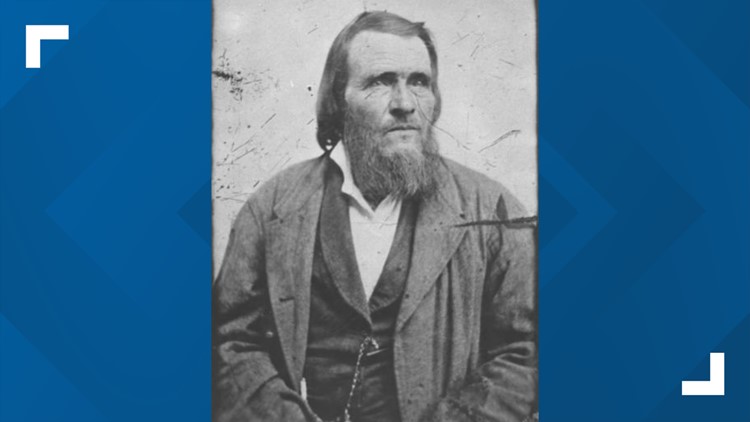ELKHART, Texas — According to the 2010 census, more than 3.7 million Texans identify as Baptists. Second only to Roman Catholicism, Baptist is the large denomination in the state.
That tradition began in 1834 in Elkhart with a man named Daniel Parker.
Parker was born in Virginia in 1781. His father, John Parker, was a minister, veteran of the American Revolution and early American frontiersman. Daniel was named after a close friend of John Parker, frontiersman Daniel Boone.
The Parkers moved to Georgia in 1785, where Daniel Parker was baptized and married in 1802. The following year, the entire Parker clan moved again to Tennessee.
In 1806, Daniel Parker became a minister at Turnball Church in Tennessee. It was around this time that Parker became a fierce advocate of Two Seedism, a doctrine, according to Baptist Standard, is based that "since the time of Adam, mankind has been the bearer of two seeds—divine and evil." The Calvinist sect believed because a person was either predestined to be good or evil, and there was nothing that could change that, missionary work or Sunday school was inherently wrong.
By the 1830's, the Parkers had set their sights on Texas. Stephen Austin personally recruited John Parker, now in his seventies and widely known at the time, to come to Texas to set up defensive forts against attacks from the Comanches. Most of the Parker clan moved to Texas in 1833, settling in Limestone County.
By then, Daniel Parker was living in Illinois, where he owned a newspaper and served as a state senator in 1822. However, when the Parker clan moved to Texas, Daniel took a trip south to find a proper location to set up a church. It was a risky move in the time before the Texas Revolution as Protestantism was strictly outlawed by the Mexican government.
To get around the law, in July 1833, Daniel Parker established the Pilgrim Predestinarian Regular Baptist Church in eastern Illinois with seven members, specifically with the purpose of moving the congregation to Texas in the mind. According to the Texas State Historical Association, the seven members were Daniel and his wife Patsey, John and Pheby Parker, Julious and Rachel Christy and Sally Brown. Julious Christy was the church's first clerk.
Shortly after the church was established, the small congregation packed up their belongings and moved south toward Texas, settling in present-day Anderson County.
On January 25, 1834, the first ever Baptist meeting in Texas history took place in Elkhart. Because the meeting was still illegal by Mexican law, the meeting was held in secret at Parker's home, which was a simple cabin at the time. During the meeting, the members voted to meet the first Sunday of each month and preceding Saturday.
For the rest of the Parker clan, the move to Texas proved tragic. The elder John Parker, still in Limestone County, had set up Fort Parker. It was there, in in May 1836, that five members of the clan were killed in a Comanche raid in what became known as the Fort Parker massacre. Among them was 77-year-old John Parker, his sons Benjamin and Silas Parker, Samuel Frost and his son Robert.
Five people were captured including John Parker's daughter Elizabeth and three of his grandchildren and one great-grandchild. Cynthia Parker, who was about 10 years old when she was captured in the raid, adopted the Comanche lifestyle, married a Comanche chieftain and refused to adjust back to white society when the Texas Rangers discovered her following the Battle of Pease River in present-day Foard County.
A month before the Fort Parker massacre, many settlers in East Texans were concerned with the advancing Mexican Army, led by General Santa Anna. The Alamo had fallen and Santa Anna seemed poised to move east and destroy what was left of the Texas Revolution. Hoping to secure the church's future, the Pilgrim Predestinarian Regular Baptist Church voted to distribute and hide the minute book from the church to ensure its survival should the Mexicans attack the area.
Meanwhile, Daniel Parker's son, Dickerson, joined the Texan Army under Sam Houston. On April 21, 1836, Houston's army defeated the Mexicans at the Battle of San Jacinto, securing independence of Texas and the future of Daniel Parker's church.
In 1837, Parker's church met again and allowed Daniel Parker to organize other Primitive Baptist congregations and ordain ministers and deacons. For the next several years, Parker and Garrison Greenwood set up a number of churches stretching from modern-day Caddo Parrish, Louisiana to Montgomery County Texas. Most of the churches were in East Texas, particularly in Nacogdoches, Shelby and Sabine counties.
At around the same time as he was setting up new congregations, Daniel Parker was elected to serve as a representative of Nacogdoches County in the General Council of Provisional Government of Texas. He was later elected to Republic of Texas Congress. However, he was prevented from claiming his seat as ordained ministers were barred from serving on the Congress.
Parker settled back in Anderson County in present-day Elkhart, where his congregation met in secret in January 1834. He died in 1844 at the age of 63. The church voted to build a permanent meeting house near his grave in 1848. The small wooden meeting house was completed in 1857 on land donated by Parker's son Caleb. Box Creek, a nearby tributary just south of the church's location, was used for baptisms.
The Pilgrim Church remains the oldest Protestant church in Texas. The current, one-room brick build, was completed in 1929. In 1949, a replica of the original church was erected near the site of the present-day church.
The story of Daniel Parker, and the rest of the Parker clan, is linked with the early history of Texas and its rise from Mexican frontier to thriving state. There are still decedents of the elder John Parker still living in Texas, still writing the story of one of the great families in Texas history.



